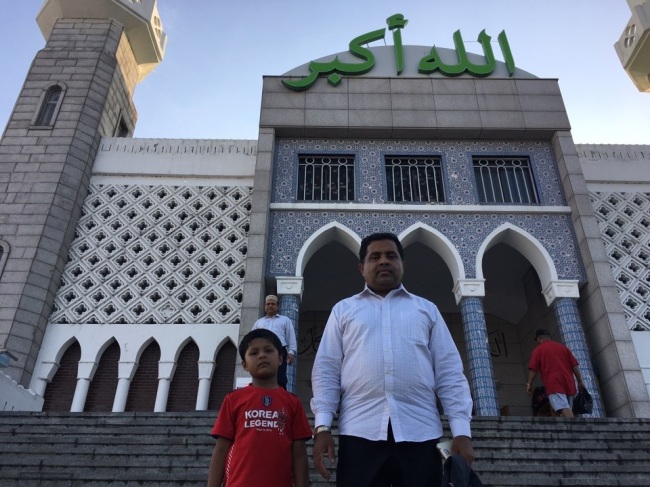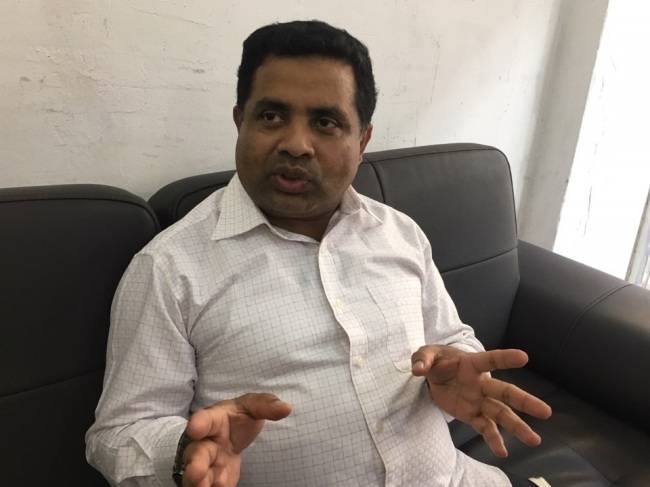Amid news of Rohingya Muslims risking their lives to escape escalating violence in Myanmar, Ishaque Mohamed, one of only 11 Rohingya people known to be living in South Korea, feels guilty that he is safe and well.
His mother and brother, who he left behind in Myanmar’s western state of Rakhine, are among thousands on a perilous journey -- either on foot or by boat -- to flee what they call “ethnic cleansing” in the nation.

Ishaque Mohamed poses for a photo with his 7-year-old child Rayyan Mohamed in front of the Seoul Central Mosque in Itaewon, Seoul, Friday. (Ock Hyun-ju/The Korea Herald)
“I cannot do anything but be stuck at home watching news on Rohingya people,” the 51-year-old said in an interview with The Korea Herald near the Seoul Central Mosque in Itaewon.
When he last talked to his mother and brother Wednesday, they were preparing to cross into Bangladesh through mountains. They said they would contact him once they had arrived in Bangladesh.
“Houses were burned down. People were raped and killed. It should be stopped,” Mohamed said, citing what his friends and family back home had told him. “Only those weak, old or sick, who are unable to travel for long have stayed behind in Rakhine.”
So far, an estimated nearly 300,000 Rohingya refugees, mostly women and children, have fled to Bangladesh to seek shelter since the outbreak of conflicts on Aug. 25, according to the United Nations.
Violence erupted when the Myanmar Army launched a counteroffensive called “clearance operation” on Rohingya insurgents who first attacked the border police.
Those who fled Rakhine describe village burnings, beatings, gang rape and mass killings in the hands of the country’s security forces and the region’s Buddhists.
Many of the refugees are stranded near rivers and on mountains, unable to cross but afraid to return home.
The Myanmar government rejects the claims, saying Rohingya residents are burning their own houses to earn sympathy from the international community. The military is fighting against Rohingya “terrorists,” it says.
Rohingya militants in Myanmar on Sunday declared a unilateral ceasefire. But the government rejected the overture, saying it would not negotiate with "terrorists."

Ishaque Mohamed (Ock Hyun-ju/The Korea Herald)
Mohamed left his native country long ago. He escaped Myanmar in fear of political persecution by Myanmar’s military regime after he participated in a pro-democracy movement in 1988 as a student.
After fleeing Myanmar, Mohamed lived in Bangladesh for 12 years. He smuggled himself to Korea in 2000 via a container ship from India. It was the first available ship that was able to get him out of Bangladesh.
Working illegally part-time at factories, he applied for asylum in 2003 and was granted refugee status in 2006. He now lives with his family -- his wife and three children who flew here from Rakhine in 2007 -- and runs his own business. His is among only two Rohingya families known to have settled here. The Justice Ministry does not keep relevant data.
“Rohingya Muslims are not terrorists. We are just taking action for our human rights. My father and my father’s father have lived in Myanmar for generations. How can the government deny our existence?” Mohamed posed.
A Muslim ethnic minority in predominantly Buddhist Myanmar, the Rohingya are described by the UN as “the world’s most persecuted minority.” There were some 1.1 million Rohingya people living in Myanmar, with most of them in Rakhine state.
Since the military junta under Gen. Ne Win came to power in 1962, Myanmar has carried out a policy of Burmanization to bolster the majority Burmese ethnic identity and Buddhism. As a result, Rohingya people were treated as illegal immigrants and denied citizenship.
When Mohamed was in Myanmar, he had revered Aung San Suu Kyi, now the country’s de facto leader. She was like a motherly figure for pro-democracy activists and students, including himself. Suu Kyi was under house arrest for years for her pro-democracy activism and won the Nobel Peace Prize in 1991.
But Mohamed said that he has been disappointed by Suu Kyi.
“We expected Aung San Suu Kyi to solve human rights violations faced by Rohingya people when she came to power, but the situation only deteriorated,” he said. “Before we are Rohingya people, we are human beings. I don’t understand why the human rights activist doesn’t care about our human rights.”
Mohamed called for the international community to help put an end to the ongoing conflicts between Rohingya residents and the Myanmarese government.
“I hope that the Korean government also speaks up for Rohingya people‘s human rights.”
Mohamed suggested that the Justice Ministry invite Rohingya families to Korea and give them permanent settlement as part of its refugee resettlement program. Through a three-year pilot program, the government has accepted 86 Myanmarese refugees, but they were not Rohingya Muslims.
“What we want is a nationality and our human rights protected while living with other Myanmar citizens,” he said. “I was born in Myanmar, I was brought up in Myanmar. I am a Myanmar citizen. I want to live in Myanmar one day when peace comes.”
(laeticia.ock@heraldcorp.com)


![[AtoZ into Korean mind] Humor in Korea: Navigating the line between what's funny and not](http://res.heraldm.com/phpwas/restmb_idxmake.php?idx=645&simg=/content/image/2024/04/22/20240422050642_0.jpg&u=)
![[Exclusive] Korean military set to ban iPhones over 'security' concerns](http://res.heraldm.com/phpwas/restmb_idxmake.php?idx=645&simg=/content/image/2024/04/23/20240423050599_0.jpg&u=20240423183955)


![[Graphic News] 77% of young Koreans still financially dependent](http://res.heraldm.com/phpwas/restmb_idxmake.php?idx=645&simg=/content/image/2024/04/22/20240422050762_0.gif&u=)
![[Herald Interview] Why Toss invited hackers to penetrate its system](http://res.heraldm.com/phpwas/restmb_idxmake.php?idx=645&simg=/content/image/2024/04/22/20240422050569_0.jpg&u=20240422150649)